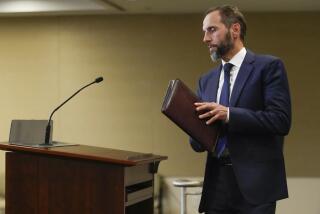Defense Rests Case in Shepard Beating Trial
- Share via
DENVER — The defense abruptly ended its case Monday in the trial of a man accused of beating Matthew Shepard, just hours after the presiding judge ruled that the so-called gay panic defense would not be allowed.
The trial in Laramie, Wyo., moved toward a swift close after state District Judge Barton Voigt ordered that the controversial defense strategy could not be employed. In a ruling drafted over the weekend, the judge said that, despite protests to the contrary from attorneys, the defense’s tactic was effectively the same as a temporary insanity or diminished capacity defense, neither of which is allowed under Wyoming law.
The judge’s ruling was not a surprise. Voigt had earlier scolded Aaron McKinney’s court-appointed defense attorneys for invoking the strategy during opening arguments. But, after the order was read in court Monday, few of the expected defense witnesses were called. Instead, by early afternoon the defense appeared to jettison the remainder of its case and rested after having called only seven witnesses. Monday was to be the first full day of testimony for the defense.
There was no rebuttal from the prosecution. Closing arguments are scheduled for today. McKinney, 22, could face the death penalty if convicted of murdering Shepard.
Police say that McKinney lured Shepard from a Laramie bar last October, robbed and beat him and then lashed him to a fence. Shepard, 21, a University of Wyoming freshman, died in a hospital days later. Russell Henderson, McKinney’s alleged accomplice, pleaded guilty in April and is serving two life sentences.
The “gay panic” defense was a flash-point in the trial, which had already been the focal point of attention from gay rights groups and others. The legal strategy holds that an unwanted sexual advance from a gay person to a heterosexual may cause an extreme reaction and lead to violence.
McKinney’s attorneys argued that sexual abuse as a child and a consensual sexual encounter with a male cousin left him angry and confused. They said that Shepard made a sexual overture toward McKinney that triggered a drug- and alcohol-induced rage.
Although McKinney’s attorneys have never referred to their strategy as a “gay panic” defense, it has been widely viewed as such.
Voigt’s order noted this, saying, “Defense counsel have tried valiantly to convince the court that their defense is not a homosexual rage defense. . . . This is the homosexual rage defense, nothing more, nothing less.”
The strategy has been employed for years, with mixed results. Some gay-rights activists object to the defense in the Shepard case, saying the strategy blames the victim. Others within the gay community say it’s a perfectly acceptable argument.
Bill Dobbs, a gay civil rights lawyer in New York City, argues that if gay bashing is often a consequence of anti-gay rage, then it is the very evidence that should be presented in a gay-beating trial.
“Gay panic is a real thing; we can’t forget that,” Dobbs said. “If we want to acknowledge that there is anti-gay panic, we can’t then make special rules when it comes to court. You can’t have it both ways.”
In recent years, the gay panic defense has successfully been employed to reduce penalties, most famously in the case of Jonathan Schmitz. Schmitz, a 27-year-old Michigan man, shot and killed Scott Amedure three days after Amedure told a studio audience at the taping of the “Jenny Jones” show of his secret crush on Schmitz. Schmitz’s attorney argued that Amedure’s confession was provocation for Schmitz’s attack. He was convicted of second-degree murder.
But some legal observers say the use of the defense, while legitimate, is on the wane. Keith Goody, a criminal defense attorney in Jackson, Wyo., employed the gay panic defense in a case in which a man stabbed to death an uncle who had molested him as a child.
The judge in Goody’s case at first banned the strategy but allowed it if the defendant took the stand. Goody’s client testified and was convicted of first-degree murder.
Goody said Monday that, even if the judge in the Shepard case forbade the evidence in the first phase of the trial, it would be allowed in the event of a penalty phase.
“The law is absolutely crystal clear that anything in mitigation is admissible,” Goody said. “The jury is going to hear this anyway. It is very, very risky for a judge to be interfering with the defense’s case. It will be a very good issue for appeal.”
More to Read
Sign up for Essential California
The most important California stories and recommendations in your inbox every morning.
You may occasionally receive promotional content from the Los Angeles Times.














